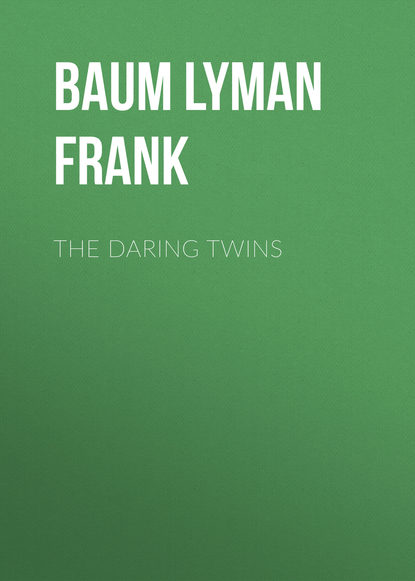По всем вопросам обращайтесь на: info@litportal.ru
(©) 2003-2024.
✖
The Daring Twins
Настройки чтения
Размер шрифта
Высота строк
Поля
“Count on me, Judge,” was the ready reply. “I don’t mind an all-night job once in a while, though I wouldn’t care for it as a steady diet. What’s next?”
They awakened the undertaker, Davis, the next thing, and after the lawyer had told him the story he at once hitched up a team to drive to the tomb for Mr. Eliot’s body. As the undertaker was also the liveryman, Mr. Ferguson obtained a single horse, harnessed to a roomy box-buggy, in which he and Sam Parsons followed the other rig. Arriving at the graveyard they held back while Davis took charge of the remains and loaded the body into the wagon, and not till he had driven away did the constable and the lawyer venture into the mausoleum, the door of which they had propped open to avoid the danger of being entombed alive.
The buggy was fairly loaded when all the treasure and the papers had been placed in it, and then they drove to the lawyer’s office, where they deposited the precious freight and Parsons watched beside it until morning.
Mr. Ferguson, meantime, got a couple of hours’ sleep; but he was back at the office by daybreak, and while waiting for the bank to open sent Sam to get his breakfast, while he himself began a systematic examination of the papers he had seized.
It did not take him long to discover that Jonathan Eliot had been a wealthy, if miserly, man. The government bonds and cash alone constituted a fortune, but aside from these were many mortgages and investments that drew a high rate of interest. There was no paper purporting to be a will; no letters of administration or any indication that the old man had transferred his holdings to Elaine Halliday, or to any other person. The deed of gift which Phœbe had seen was doubtless secreted upon the person of the housekeeper.
While the judge was thus absorbed in the papers the day advanced and Spaythe’s Bank was opened for business. Phil, arriving at his usual time, found Mr. Spaythe already in his office and the door communicating with the countingroom wide open.
Moreover, the banker seemed laboring under unusual excitement. He would walk the floor of his office with nervous strides, then seat himself in the chair by his desk, and a few moments later resume his pacing. At times he glanced into the room where Phil was at work, or toward the cage where the cashier was busy. Eric had not yet arrived.
Presently in came Judge Ferguson, accompanied by Sam Parsons, and both were loaded down with gold and bank notes.
“Good morning, Spaythe,” called the judge, nodding genially. “I want to make an important deposit, to be credited to the Estate of Jonathan Eliot.”
“Eliot!” exclaimed the banker. “Is the old man dead, then?”
“Very dead, Spaythe; and he’s left a lot of money. Here, Boothe, count it – and count it carefully, my man – for this is the biggest deposit your bank has ever received.”
Phil had overheard this, and came forward with a pale and troubled face.
“Is it true, sir?” he asked, half frightened.
“Yes, Phil; it’s true.”
“When did my grandfather die?”
“Two or three days ago, I think. But we only discovered his body last night, lying in that tomb he built, where Elaine Halliday had carried him after propping up a dummy in the window to make us all believe he was still alive.”
Then they all went into the private office, where Mr. Ferguson related the night’s occurrences to Mr. Spaythe and Phil Daring, the constable being present to confirm the story.
“Had it not been for the bravery of Toby Clark,” concluded the judge, “we might all three have been buried alive in that hideous tomb. No one could have come to our assistance, for no one knew where we had gone.”
“The woman must be crazy,” asserted the banker.
“Perhaps; but she’s clever enough in some ways,” sighed the lawyer, “and may cause us a lot of trouble yet. That’s why I have deposited this money to the credit of the Eliot Estate. No one can touch it now until the courts decide to whom it belongs. And, by the way, Spaythe, that three thousand, three hundred and ninety dollars I borrowed from you is among the lot!”
During this conversation Eric had entered the bank, and seeing the interested group gathered in his father’s office came to the open door just as the judge again mentioned the fatal sum that he had stolen from the safe. His face instantly went white with terror, and he was creeping away when Mr. Spaythe sprang up, seized his son’s arm and drew him into the office.
“Gentlemen,” said the banker, turning to the others, “I too have a story to relate, and I beg you to seat yourselves and listen.”
“May I go, sir?” asked Phil in a troubled tone.
“No, Daring; you must remain; for what I have to say concerns you closely. Sit down.”
Phil sat down. Judge Ferguson glanced from Phil to Eric, who stood with hanging head; then to Mr. Spaythe, whose countenance was cold and severe and bore the marks of a secret sorrow. The constable, accustomed to strange scenes, remained impassive and silent.
“On Saturday night,” began Mr. Spaythe, in a hard, resolute tone, “this bank was robbed of three thousand, three hundred and ninety dollars, in gold and currency.”
Eric staggered and caught at the corner of the desk for support. Phil grew pale, for he was astonished at the banker’s knowledge. Mr. Ferguson knew the fact already, having listened to Phœbe’s confession, so he merely glanced at the father and son in a thoughtful way and refrained from comment.
“My son had warned me,” continued the banker, speaking bitterly, “that Phil Daring would not be liable to withstand the temptation of stealing money, once he was alone in the bank and knew the combination of the safe. At first I scorned the idea; then, for my own satisfaction, I decided to watch. Here in my door is a sliding panel, through which I am able to observe, when I so desire, everything that goes on in the back room. On Saturday night I came here, letting myself in at the private entrance to this room, and found Phil Daring working on the books while his twin sister sat beside him. From their conversation I discovered that they knew the bank was about to be robbed. They arranged to watch the robbery unobserved, and I decided to do likewise. At midnight a man entered the bank, opened the safe and took away three thousand, three hundred and ninety dollars. That man,” he added, pointing a merciless finger toward the culprit, “was my own son.”
No one spoke. Eric tried to answer, but a sob choked him. He had raised his head now and was reading his father’s face with a fascinated and horror-stricken gaze.
“From the conversation of the two Darings,” went on Mr. Spaythe, “I learned that Eric had so plotted that Phil was to be accused of the crime – and of other peculations that preceded it. The girl promised to save her brother, and I was curious to know how she would do it. To my amazement they brought the money to the bank on Sunday evening, and I saw them replace it in the safe – every penny that Eric had taken. The act was so astonishing, so wholly unexpected and inexplicable, that there seemed but one possible solution: that the Darings had in some way forced Eric to give up the stolen money. So I kept silent, waiting for an explanation, or for some further development; for if Eric had been shown the folly and wickedness of his crime it might be better for him not to know that I had discovered it. I may have been weak in this; but, gentlemen, he is my son.”
The banker paused, pressed his lips firmly together, and after a time resumed his statement.
“Further developments occurred, indeed, but they served to undeceive me, and to add to my perplexity. Eric restored to the bank several hundred dollars which he had formerly embezzled; he also paid his debts around town, amounting to several hundred dollars more; I have a list of them. Therefore, he could not have returned to the Darings the money he took from the safe on Saturday night – and he had no other money.”
Eric drew a long and tremulous sigh. Then he sank into a chair and buried his face in his hands. The tale was all new to him, and he found the truth vastly different from what he had imagined. Also, despair had seized him in its pitiless grasp, and as his eye by chance fell upon the constable he shuddered. His father’s intentions were clear to him now.
“Another surprising circumstance,” said Mr. Spaythe, ignoring Eric’s dejected attitude, “was Judge Ferguson’s demand upon me for the exact sum Eric had stolen – the exact sum Phœbe Daring had restored to the safe. Therefore, I have asked you to listen to me that you may understand I am entitled to some explanation. My son’s crime is known to the Darings and to Mr. Ferguson, as well as to myself; I, only, am in the dark concerning the events which followed it.”
“Those events I can explain in a few words, sir,” said the judge, his kindly voice showing how deeply he was grieved for his old friend. “Phœbe Daring had discovered her grandfather’s hoard, which Miss Halliday had secreted in her own room. To save her brother from unjust accusation the girl took the sum required to make good Eric’s – eh – eh – withdrawal. Miss Halliday claimed this money was given her by Jonathan Eliot, by a deed of gift, and threatened Phœbe with jail unless she returned the entire sum. It was my purpose just then to lull old Elaine’s suspicions; so I borrowed the money from you, Mr. Spaythe, that Phœbe might return it to her grandfather’s housekeeper. So you see that after all the various conspiracies, Spaythe’s Bank is still short that identical sum of three thousand, three hundred and ninety dollars.”
“Not the bank, sir,” said the other harshly, “but my personal account is short that sum. You are relieved of all obligation to return it, Judge Ferguson.”
The lawyer bowed.
“In that case,” said he, somewhat embarrassed, “perhaps you will permit us now to withdraw.”
The banker sat silent a moment, his stern face pallid and thoughtful. Then he turned to Phil.
“Mr. Daring,” he said, “I owe to you and to your brave sister my thanks for your discretion and consideration of me in the conduct of this unfortunate affair. Eric owes you a still greater debt. You have behaved as a man, sir; I wish to God you had been my son instead of that cowering criminal seated before me. Will you add a little to my obligation – will you do me another favor?”
“If I may, sir,” said Phil, flushed and miserable despite this praise.
“Tell me what punishment to inflict upon this – thief.”
Phil straightened up and looked squarely into the banker’s eyes. He had longed for this question; the opportunity was now his.
“Sir,” he replied, “I know Eric; I have known him for years. His fault lay in his extravagant tastes, which forced him into debt because his father would not give him as much money as he thought he needed. The debts drove him to crime, and for his crime he has already suffered such punishment as all your proposed severity could not inflict upon him. I know Eric – tender-hearted, generous and kind – not bad, sir, in spite of this offense he was so weak as to commit. If you will forgive him, Mr. Spaythe, if you will love him and take him to your heart again, I promise that never in the future will you have cause to regret it. Eric will be honest and true from this day forward. But if, on the other hand, you now cast him off, you will ruin his life and your own; for a boy condemned by his own father can hope for no mercy from the world. He is your only son, Mr. Spaythe; forgive him.”
During this impassioned speech, which came straight from the young fellow’s heart, the banker sat staring at him with dull, expressionless eyes. Eric had raised his head to gaze at Phil wonderingly. Then he turned to his father a pleading look that might have melted his anger had he seen it; but Mr. Spaythe still stared at Phil Daring, as if dazed by the boy’s frankness.
Mr. Ferguson slowly rose and laid an arm across the banker’s shoulder. The gesture was strangely caressing, as between one man and another.
“Phil is right, Duncan,” he said softly. “The boy is your son, and you can make a man of him, if you will.”
Slowly the banker’s head drooped until it rested upon his arms, outstretched upon the flat desk before him. For a time he remained motionless, while those who watched and waited scarce dared to breathe.
Then Mr. Spaythe looked up, and the sternness had left his face.
“Eric,” he said, “you are forgiven.”

















